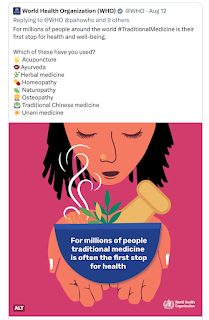Did WHO really acknowledge Homeopathy????
A Milestone for Holistic Health:
WHO Recognizes Homeopathy
In a significant stride towards embracing holistic healthcare, the World Health Organization (WHO) recently made headlines by acknowledging homeopathy as a leading medical system used worldwide. This recognition is being hailed as a pivotal moment for advocates of natural remedies and those who believe in the power of complementary therapies. In this blog, we will explore the positive aspects of WHO's recognition and shed light on how it can contribute to the well-being of individuals around the world.
A Global Shift Toward Holistic Healthcare
The WHO's acknowledgment of homeopathy as a prominent medical system reflects a growing appreciation for holistic approaches to health and well-being. Homeopathy, which treats the whole person rather than just addressing symptoms, aligns with the WHO's focus on achieving a state of complete physical, mental, and social well-being.
A Personalized Approach to Healing
One of the key strengths of homeopathy lies in its personalized approach to healing. Homeopathic treatments are tailored to an individual's unique constitution, considering their physical, emotional, and psychological characteristics. This patient-centered approach aligns with the shift towards personalized medicine, where treatments are customized to meet the specific needs of each patient.
Natural Remedies and Minimal Side Effects
Homeopathy is renowned for its use of highly diluted natural substances, which are believed to stimulate the body's own healing mechanisms. This emphasis on natural remedies resonates with a growing global interest in reducing reliance on synthetic medications. Furthermore, the minimal to no side effects associated with homeopathic treatments make them an attractive option for individuals seeking gentle and non-invasive solutions to their health concerns.
Cultural Diversity and Traditional Knowledge
The recognition of homeopathy by the WHO acknowledges the rich cultural diversity of healing practices across the world. For many societies, homeopathy has been an integral part of their healthcare traditions for generations. This recognition preserves and celebrates the wisdom passed down through these cultural practices, fostering a deeper understanding of global healthcare diversity.
Complementary Harmony with Conventional Medicine
Contrary to misconceptions, the recognition of homeopathy by WHO does not signify an exclusion of conventional medicine. Instead, it paves the way for a more harmonious integration of both approaches. Many individuals are seeking a balanced approach to healthcare, combining evidence-based conventional treatments with holistic practices like homeopathy to optimize their well-being.
Empowerment through Choice
WHO's recognition of homeopathy empowers individuals to make informed choices about their healthcare journeys. It offers people the freedom to explore a variety of medical options and decide what resonates best with their beliefs and preferences. This sense of agency can contribute significantly to a person's overall sense of well-being.
Fostering Research and Collaboration
The recognition of homeopathy by a global institution like WHO is expected to encourage further research into this field. As more attention is directed towards homeopathic treatments, researchers and practitioners will have the opportunity to collaborate on studies, share insights, and advance the understanding of how these treatments can complement conventional medical care.
our thoughts ?????
The World Health Organization's recognition of homeopathy as a leading medical system used worldwide marks an inspiring shift towards embracing holistic and patient-centered healthcare. With a focus on natural remedies, individualized treatments, and cultural diversity, homeopathy brings a unique perspective to the global healthcare landscape. As the dialogue continues, this recognition invites us to explore the possibilities of a harmonious coexistence between conventional medicine and complementary therapies, ultimately paving the way for a more holistic approach to health and healing.







Comments
Post a Comment